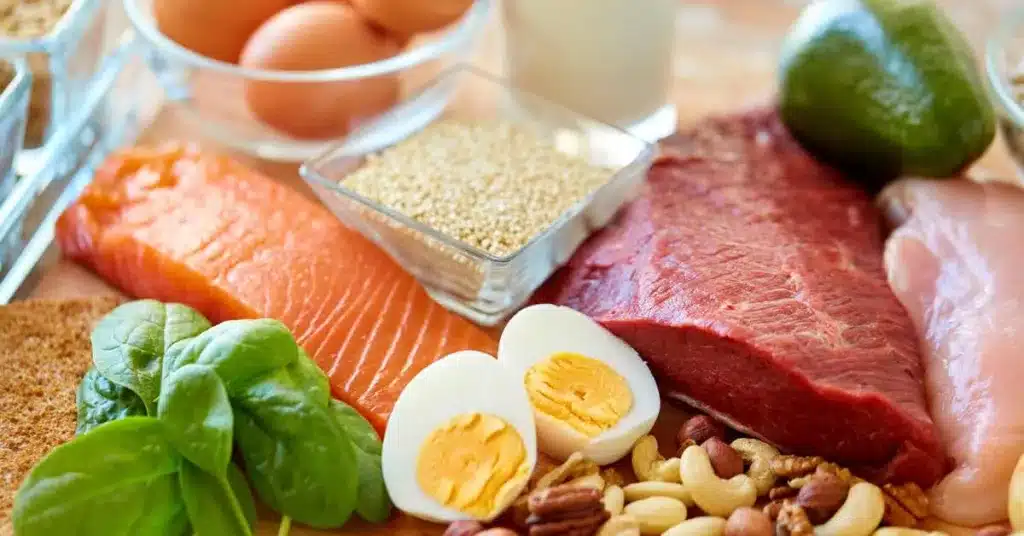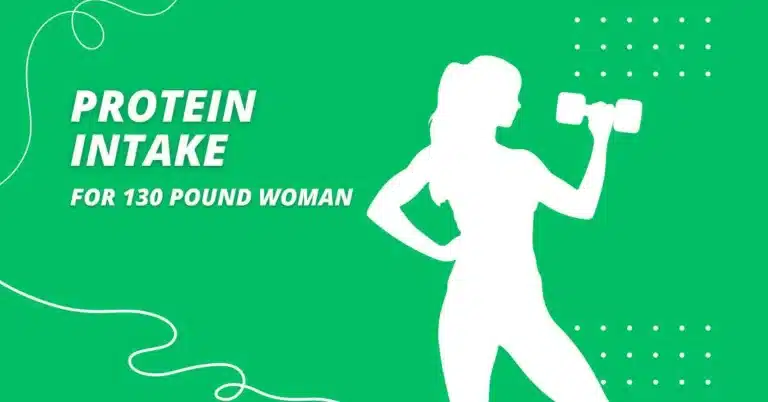Protein is a critical macronutrient in any diet, especially for those aiming to lose weight while preserving muscle mass. It plays a vital role in the repair and growth of tissues, and is crucial for hormonal and enzymatic activities. For a 130-pound woman wondering how much protein she should eat to lose weight, it’s essential to tailor her protein consumption to support her specific weight loss and health maintenance objectives.
Table of contents
Determining Protein Needs
Determining the specific protein needs for weight loss, particularly for a 130-pound woman, involves understanding several key factors that influence dietary requirements. These factors include body weight, activity level, age, and overall health.
Body Weight and Composition: The most basic guideline for protein intake is derived from body weight. General health recommendations often suggest a baseline of 0.8 grams of protein per kilogram of body weight per day for the average individual. However, for those looking to lose weight or engage in regular physical activity, this amount might need to be adjusted. The Academy of Nutrition and Dietetics suggests increasing this amount to 1.2 to 1.7 grams per kilogram for those who are active and aiming for weight loss, to support muscle repair and growth (Eat This Not That).
Activity Level: The level of physical activity significantly impacts protein needs. Active individuals, particularly those who engage in strength training or high-intensity workouts, require more protein to repair muscles and support recovery.
Age and Health Status: Age also plays a critical role in determining protein needs. Older adults may need higher protein intake to counteract age-related muscle loss, known as sarcopenia. Additionally, specific health conditions may alter protein requirements. For instance, individuals with kidney disease are often advised to limit protein intake due to the kidney’s role in protein metabolism – Cleveland Clinic.
Calculating Exact Needs: To calculate exact protein needs, one must consider all these factors in conjunction. For example, a 130-pound woman looking to lose weight might start at the higher end of the recommended range due to her activity level. Using a protein calculator that considers weight, age, activity level, and goals can provide a more personalized guideline. This tailored approach helps ensure that protein intake is sufficient to support metabolic health, muscle maintenance, and weight loss efforts.
Protein Recommendations for a 130-pound Woman
A 130-pound woman aiming to lose weight can tailor her protein recommendations precisely by considering her activity level, overall health, and specific weight loss goals. Here’s a breakdown of how these factors influence the amount of protein she should consume:
Activity Level Considerations: Protein needs increase with activity level. For women engaged in regular exercise, especially those doing strength training or intense aerobic workouts, protein requirements are higher to support muscle repair and recovery. According to fitness and nutritional guidelines, such women may benefit from consuming approximately 1.2 to 1.7 grams of protein per kilogram of body weight. For a 130-pound woman (approximately 59 kilograms), this translates to about 71 to 100 grams of protein per day. These figures align with those suggested for muscle preservation and enhancement of metabolic rate during a caloric deficit (StrengthLog).
Weight Loss Goals: When focusing on weight loss, it’s crucial to consume enough protein to not only preserve lean muscle mass but also help manage hunger. Studies indicate that protein’s satiating effect can lead to reduced caloric intake and more effective weight management. For a woman weighing 130 pounds, consuming protein at the upper end of the recommended range can support these outcomes, especially if she’s in a caloric deficit.
Health and Dietary Preferences: Adjustments might also be needed based on health considerations. For instance, individuals with certain health conditions such as kidney issues may need to modulate their protein intake under medical guidance (Cleveland Clinic).
Additionally, dietary preferences play a role; whether she opts for plant-based sources like lentils and tofu or animal-based sources such as lean meats and dairy can influence the volume and type of protein consumed.
Best Sources of Protein for Weight Loss

1. Lean Animal Proteins: Lean meats such as chicken breast, turkey, and lean cuts of beef or pork provide high amounts of protein with relatively low fat content. Fish like salmon and trout not only offer high-quality protein but also contain beneficial omega-3 fatty acids that support overall health.
2. Dairy Products: Low-fat dairy products, such as Greek yogurt, cottage cheese, and skim milk, are excellent sources of protein that also contribute calcium and other essential nutrients. These dairy options are particularly beneficial due to their muscle-repairing amino acids and their role in enhancing satiety.
3. Plant-Based Proteins: For those who prefer a plant-based diet or want to diversify their protein sources, legumes (like lentils, chickpeas, and black beans), soy products (such as tofu and tempeh), and quinoa are excellent choices. These foods provide not only protein but also fiber, which helps in weight loss by keeping you fuller for longer periods. Read more about our Plant-based Proteins guide.
4. Eggs: Eggs are a low-calorie source of protein that are also rich in vitamins and minerals. The versatility of eggs makes them easy to incorporate into a weight loss diet, providing satiety and nutrient density with relatively few calories.
5. Protein Supplements: While whole foods are the best source of nutrients, protein powders and bars can be useful for on-the-go meals or when dietary protein needs are not being met through food alone. When selecting protein supplements, choose those with minimal added sugars and fillers, focusing on products that provide pure protein to aid in weight loss and muscle maintenance.
Risks & Considerations About Protein Intake
While a high-protein diet is beneficial for weight loss and muscle maintenance, there are several risks and considerations that should be taken into account, especially for individuals with certain health conditions or dietary restrictions.
1. Kidney Health: High protein intake is often discouraged for individuals with pre-existing kidney conditions. Protein metabolization puts a strain on the kidneys, and overconsumption can exacerbate kidney problems, potentially leading to increased risk of kidney disease progression. It’s crucial for those with kidney issues to consult healthcare providers to tailor their protein intake appropriately.
2. Heart Health: Some sources of protein, especially those high in saturated fats such as certain meats and full-fat dairy products, can contribute to cardiovascular issues. Diets high in red meat have been associated with higher risks of heart disease and stroke. Opting for leaner proteins and incorporating more plant-based proteins can mitigate these risks.
3. Bone Health: There is some debate around the impact of very high protein diets on bone health. While protein is essential for bone maintenance, excessive intake might lead to calcium leaching from bones if not balanced with adequate dietary calcium, though this effect is still under scientific review.
4. Digestive Health: High-protein diets that lack sufficient fiber can lead to digestive discomforts such as constipation. This is particularly true when protein intake comes predominantly from animal sources which contain no fiber. To avoid such issues, it is important to include fiber-rich foods like vegetables, fruits, and whole grains in one’s diet (MBG).
5. Nutritional Balance: Focusing heavily on protein might lead some to under consume other vital nutrients. A balanced diet that includes carbohydrates and fats is essential as these macronutrients also play crucial roles in overall health and energy supply.
FAQs
How much protein should a 130-pound woman eat to lose weight?
For weight loss, a 130-pound woman should aim to consume between 1.2 to 1.7 grams of protein per kilogram of body weight daily. This amounts to approximately 71 to 100 grams of protein per day depending on her physical activity and specific health goals.
What are the best protein sources for weight loss?
High-quality protein sources ideal for weight loss include lean meats like chicken and turkey, fish such as salmon, plant-based proteins like lentils and tofu, low-fat dairy products, and eggs. These sources are not only rich in protein but also offer other essential nutrients beneficial for overall health.
Can eating too much protein be harmful?
Yes, excessive protein intake can lead to health issues such as kidney strain, especially in individuals with pre-existing kidney conditions, and potential cardiovascular problems linked to high saturated fat intake from some protein sources. It’s important to consume a balanced diet and consult health professionals if you have underlying health issues.
How does protein affect metabolism and weight loss?
Protein can boost metabolism because of its high thermic effect, meaning the body uses more energy to digest it compared to fats and carbohydrates. This can help increase the number of calories burned throughout the day. Additionally, protein is very satiating, which can help reduce overall calorie intake by making you feel fuller longer.
Are protein supplements necessary for weight loss?
Protein supplements can be a convenient way to meet your protein needs, especially when dietary intake is insufficient or when convenience is a factor. It’s important to choose supplements wisely, focusing on those with minimal additives and sugars.
What should I do if I have dietary restrictions but need to increase protein intake?
For those with dietary restrictions, exploring plant-based proteins or hypoallergenic protein sources like pea protein can be beneficial. It’s also useful to consult with a dietitian to plan a diet that safely meets your protein and nutritional needs while accommodating your restrictions.
Conclusion
In conclusion, understanding how much protein a 130-pound woman should consume to lose weight involves an approach that considers her physical activity level, health status, and personal goals. It is also important to be cautious of the potential risks associated with excessive protein intake, particularly for individuals with certain health conditions like kidney disease.

